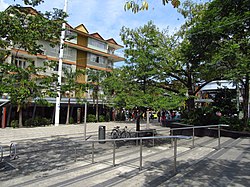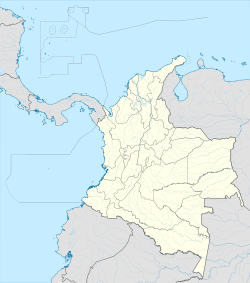Envigado | |
|---|---|
Municipality and city | |
 | |
 Location of the municipality and town of Envigado in the Antioquia Department of Colombia | |
| Coordinates: 6°10′19″N 75°34′49″W / 6.17194°N 75.58028°W | |
| Country | |
| Department | |
| Founded | 1775 |
| Government | |
| • Mayor | Braulio Espinosa |
| Area | |
| • Municipality and city | 78.78 km2 (30.42 sq mi) |
| • Urban | 13.02 km2 (5.03 sq mi) |
| Elevation | 1,675 m (5,495 ft) |
| Population (2018 census)[1] | |
| • Municipality and city | 228,848 |
| • Density | 2,900/km2 (7,500/sq mi) |
| • Urban | 215,766 |
| • Urban density | 17,000/km2 (43,000/sq mi) |
| • Metro | 3,312,165 |
| Demonym | Envigadeño |
| Time zone | UTC-5 (Colombia Standard Time) |
| Area code | 57 + 4 |
| Website | [1] (in Spanish) |
Envigado (Spanish pronunciation: [embiˈɣaðo]) is a city and municipality due South of Medellín, Colombia in the department of Antioquia. It is located in the Metropolitan Area of the Aburrá Valley. It borders El Poblado, Medellín to the north, Sabaneta to the south, El Retiro and Caldas to the east, and Itagüí to the west.
Envigado is known for maintaining the traditions of the Paisa Region and for its architecture. It also has one of the highest standards of living in Colombia, and (according to the Colombian magazine Semana), has the country's lowest rate of what the magazine calls, “people with unmet basic needs”.[2]
Its recent history is closely associated with Pablo Escobar and the Medellin cartel.[3] Despite its connection with Escobar, the Aburrá Valley now has one of the lowest homicide rates in Colombia: 6 for every 100,000 people,[4]
Envigado is the hometown of the Colombian writer and philosopher Fernando González. His house, Otraparte, today is a cultural center and museum dedicated to his memory and works.
- ^ Citypopulation.de Population of Envigado municipality with localities
- ^ "Los 10 municipios más ricos del país". especiales.semana.com. Retrieved 2019-05-05.
- ^ "Pablo Escobar | Profile". colombiareports.com. Retrieved 2016-04-18.
- ^ "Los cinco mejores 'vivideros' de Colombia según planeación nacional". El Universal Cartagena. Retrieved 2016-04-18.


